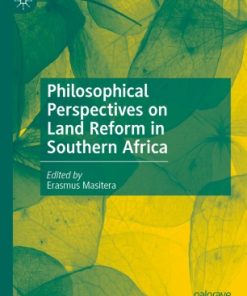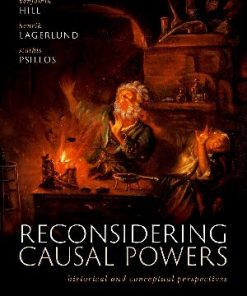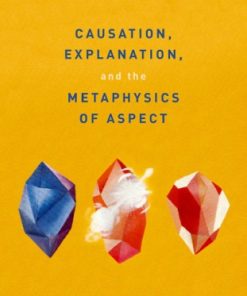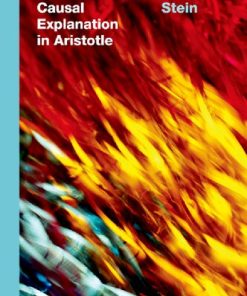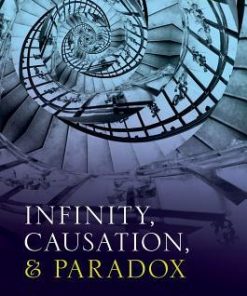(Ebook PDF) Explanation Beyond Causation Philosophical Perspectives on Non Causal Explanations 1st edition by Alexander Reutlinger, Juha Saatsi 0191083801 9780191083808 full chapters
$50.00 Original price was: $50.00.$25.00Current price is: $25.00.
Explanation Beyond Causation: Philosophical Perspectives on Non-Causal Explanations 1st edition by Alexander Reutlinger, Juha Saatsi – Ebook PDF Instant Download/DeliveryISBN: 0191083801, 9780191083808
Full dowload Explanation Beyond Causation: Philosophical Perspectives on Non-Causal Explanations 1st edition after payment.
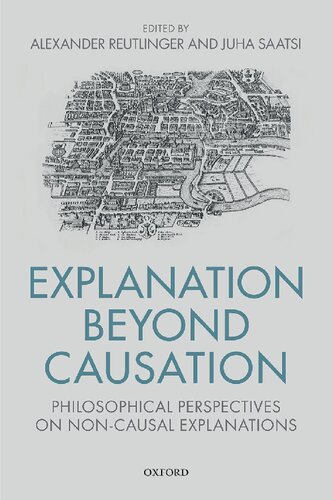
Product details:
ISBN-10 : 0191083801
ISBN-13 : 9780191083808
Author: Alexander Reutlinger, Juha Saatsi
Explanations are important to us in many contexts: in science, mathematics, philosophy, and also in everyday and juridical contexts. But what is an explanation? In the philosophical study of explanation, there is long-standing, influential tradition that links explanation intimately to causation: we often explain by providing accurate information about the causes of the phenomenon to be explained. Such causal accounts have been the received view of the nature of explanation, particularly in philosophy of science, since the 1980s. However, philosophers have recently begun to break with this causal tradition by shifting their focus to kinds of explanation that do not turn on causal information. The increasing recognition of the importance of such non-causal explanations in the sciences and elsewhere raises pressing questions for philosophers of explanation. What is the nature of non-causal explanations – and which theory best captures it? How do non-causal explanations relate to causal ones? How are non-causal explanations in the sciences related to those in mathematics and metaphysics? This volume of new essays explores answers to these and other questions at the heart of contemporary philosophy of explanation. The essays address these questions from a variety of perspectives, including general accounts of non-causal and causal explanations, as well as a wide range of detailed case studies of non-causal explanations from the sciences, mathematics, and metaphysics.
Explanation Beyond Causation: Philosophical Perspectives on Non-Causal Explanations 1st Table of contents:
PART I: General Approaches
1: Because Without Cause: Scientific Explanations by Constraint
1. Introduction
2. Three Varieties of Explanation by Constraint
3. Varieties of Necessity
4. How do Explanations by Constraint Work?
5. What Makes a Constraint Explanatorily Fundamental?
6. Conclusion
References
2: Accommodating Explanatory Pluralism
1. Introduction: Strong and Weak Explanatory Pluralism
2. Three Types of Explanation
3. Ontic Accounts
4. Contrastive Facts and a Viable Ontic Strategy
5. A Viable Epistemic Strategy
Acknowledgments
References
3: Eight Other Questions about Explanation
1. Introduction
2. Human Explainers
Question 1: Priority of communication
Question 2: Connection to understanding
Question 3: Psychology of explanation
3. Explanations as Representations
Question 4: Priority of representation
Question 5: The representational aims of explanation
Question 6: Relationship to other scientific aims
4. Ontic Explanations
The question of the nature of explanatory dependence
Question 7: Priority of the ontological dimension
Question 8: Level of explanation
5. Conclusion
Acknowledgments
References
4: Extending the Counterfactual Theory of Explanation
1. Introduction
2. Theoretical Options
3. The Counterfactual Theory of Explanation
4. Applying the Counterfactual Theory of Explanation
4.1 Hempel’s pendulum explanation
4.2 Fermat’s explanation
4.3 Euler’s explanation
4.4 Renormalization group explanations
4.5 Kahneman and Tversky’s explanation
5. Distinguishing Non-Causal and Causal Explanations: The Russellian Strategy
6. Conclusion
Acknowledgments
References
5: The Mathematical Route to Causal Understanding
1. Introduction
2. Mathematics Gives Us the Gift of Scientific Understanding
3. The Role of Mathematics in Scientific Explanation
4. Explanatory Relevance as Causal Difference-Making
5. Mathematics and Causal Understanding
6. Explanation Beyond Causation?
References
6: Some Varieties of Non-Causal Explanation
1. Introduction
2. An Interventionist Account of Causation and Causal Explanation
2.1 Interventions and counterfactual dependence
2.2 Invariance
2.3 Causal relationships distinguished from conceptual and mathematical relationships
2.4 Interventionism is a permissive account of causation
3. Non-Causal Explanations Not Involving Interventions
4. Non-Causal Explanations Involving Mathematical Dependencies but with Manipulable Explanatory Fact
5. The Role of Information about Irrelevance in Explanation
6. Conclusion
Acknowledgments
References
PART II: Case Studies from the Sciences
7: Searching for Non-Causal Explanations in a Sea of Causes
1. Introduction
2. Model-Based Explanations
3. What Makes an Explanation Non-Causal?
4. Explaining the Formation of Sand Ripples
5. Conclusion
Acknowledgments
References
8: The Development and Application of Efficient Coding Explanation in Neuroscience
1. Introduction
2. Efficient Coding Explanation and the Causal/Non-Causal Frontier
3. Lateral Inhibition and Explanations of Early Visual Responses
3.1 Edge detection
3.2 Redundancy reduction
3.3 Predictive coding
3.4 Some observations
4. Putting Efficient Coding Explanations to Use
4.1 Scaling the data mountain
4.2 Forward engineering
4.3 Defining neural computation
5. Conclusion
Acknowledgments
References
9: Symmetries and Explanatory Dependencies in Physics
1. Introduction
2. Symmetry and Explanation: A Toy Example
3. Discrete Symmetries
4. Continuous Symmetries
5. Conclusion
Acknowledgements
References
10: The Non-Causal Character of Renormalization Group Explanations
1. Introduction
2. Non-Causal, Mathematical Explanation—Some Background
3. RG, Statistical Mechanics, and Micro-Causality
4. Structural Features of RG Explanations
5. RG and Probabilistic Explanations: Disentangling the Differences
6. Dynamical Systems and RG Explanations
7. Conclusions
Acknowledgements
References
PART III: Beyond the Sciences
11: Two Flavours of Mathematical Explanation
1. Introduction
2. A Few Words about Methodology
3. The Free Group Theorem
4. Free Group Theorem: The “Constructive” Proof
5. Free Group Theorem: The “Abstract” Proof
6. The Explanatory Value of the Proofs
6.1 The constructive proof and local dependence-based explanatory value
6.2 The abstract proof and global unification-based explanatory value
6.3 Which proof is more explanatory?
Acknowledgements
References
12: When are Structural Equation Models Apt? Causation versus Grounding
1. Introduction
2. The Formalism of Structural Equations Models
2.1 Structural equations modelling of causal scenarios
2.2 Structural equations modelling of grounding scenarios
3. Aptness of Structural Equations Models
3.1 Aptness of causal structural equations models
3.2 Aptness of grounding structural equations models
4. Conclusion
People also search for Explanation Beyond Causation: Philosophical Perspectives on Non-Causal Explanations 1st:
causation explained
actual and proximate causation
explain beyond a reasonable doubt
explaining beyond a reasonable doubt to a jury
explanatory cause
You may also like…
Politics & Philosophy
Politics & Philosophy - Anthropology
Politics & Philosophy - Anthropology
Politics & Philosophy - Anthropology
Uncategorized
Politics & Philosophy
dictionaries & phrasebooks
Bad Words: Philosophical Perspectives On Slurs 1st Edition David 0191076376 9780191076374
Politics & Philosophy - General & Miscellaneous Philosophy
Infinity Causation and Paradox 1st edition by Alexander Pruss 0192538284 9780192538284





